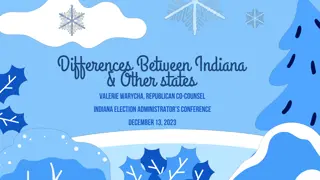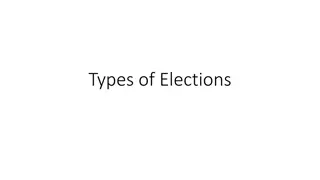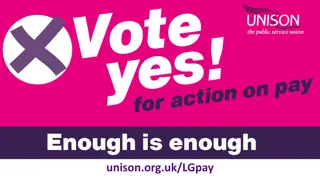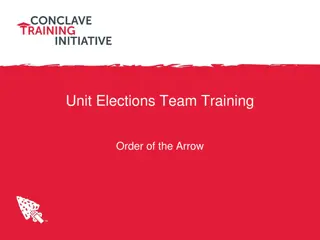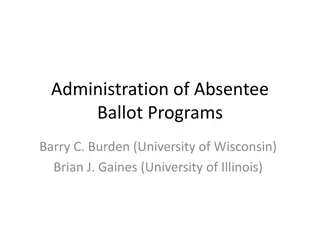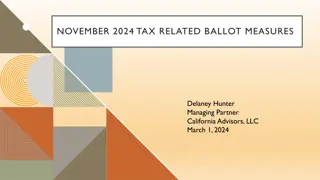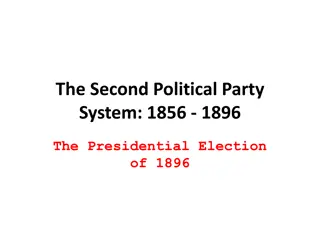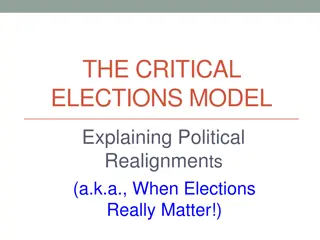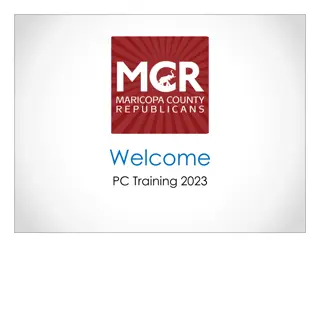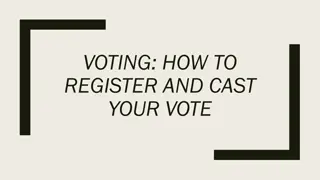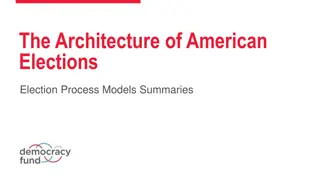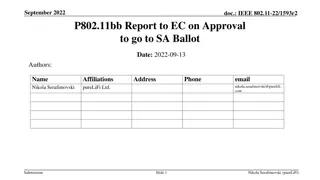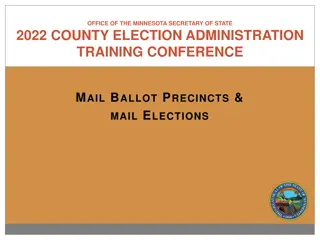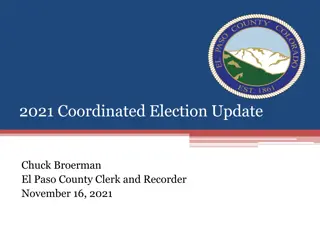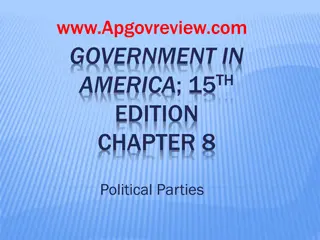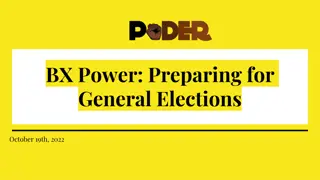Understanding Ballot Access and Political Party Definitions for Elections
Learn about the definitions of key terms related to elections, such as caucus, convention, party-endorsed candidate, primary, district, municipal office, major party, minor party, state office, and endorsement. These definitions provide insight into the electoral process, including how candidates are selected for different offices and the criteria for party endorsement in state, district, and municipal elections.
Download Presentation

Please find below an Image/Link to download the presentation.
The content on the website is provided AS IS for your information and personal use only. It may not be sold, licensed, or shared on other websites without obtaining consent from the author. Download presentation by click this link. If you encounter any issues during the download, it is possible that the publisher has removed the file from their server.
E N D
Presentation Transcript
Ballot Access Registrars of Voters 2018
Definitions Caucus means any meeting of the enrolled members of a political party within a municipality or political subdivision for the purpose of selecting party- endorsed candidates for a primary to be held by such party or for the purpose of transacting other business of such party. Convention means a meeting of delegates of a political party held for the purpose of designating the candidate or candidates to be endorsed by such party in a primary of such party for state or district office or for the purpose of transacting other business of such party. Party-endorsed candidate means (A) in the case of a candidate for state or district office, a person endorsed by the convention of a political party as a candidate in a primary to be held by such party, and (B) in the case of a candidate for municipal office or for member of a town committee, a person endorsed by the town committee, caucus or convention, as the case may be, of a political party as a candidate in a primary to be held by such party. Primary means a meeting of the enrolled members of a political party and, when applicable under section 9-431, unaffiliated electors, held during consecutive hours at which such members or electors may, without assembling at the same hour, vote by secret ballot for candidates for nomination to office or for town committee members. District means any geographic portion of the state which crosses the boundary or boundaries between two or more towns.
Definitions District office means an elective office for which only the electors in a district may vote. Municipal office means an elective office for which only the electors of a single town, city, borough, or political subdivision may vote. Major party means (A) a political party or organization whose candidate for Governor at the last-preceding election for Governor received, under the designation of that political party or organization, at least twenty per cent of the whole number of votes cast for all candidates for Governor, or (B) a political party having, at the last-preceding election for Governor, a number of enrolled members on the active registry list equal to at least twenty per cent of the total number of enrolled members of all political parties on the active registry list in the state. Minor party means a political party or organization which is not a major party and whose candidate for the office in question received at the last-preceding regular election for such office, under the designation of that political party or organization, at least one per cent of the whole number of votes cast for all candidates for such office at such election. State office means any office for which all the electors of the state may vote and includes the office of Governor, Lieutenant Governor, Secretary, Treasurer, Comptroller, Attorney General and senator in Congress, but does not include the office of elector of President and Vice-President of the United States.
Endorsement Party endorsement achieved for a state or district office through the convention process. A candidate must receive at least 15% of any roll call vote taken at the convention. Party endorsement is achieved for a municipal office (including the office of single town state representative) or for member of a town committee through (1) town committee process, (2) caucus, or (3) local convention. Party rules of a State Central Committee or of a local town committee will dictate what endorsement mechanism will be used and how the mechanism will be run.
Challenge Endorsement Primary (Two Methods) Party endorsements for a state or district office can be challenged in two different manners; each ultimately resulting in a primary: Receive at least 15% of any roll call vote taken at a convention. File a primary petition consisting of a total signature amount equal to at least 5% of the enrolled party members in the district. (2% in Congressional district or statewide office). Petitions are available from the Secretary of the State after the close of the convention. (105 days before the primary for statewide or congressional offices) Party endorsements for municipal offices (including the office of single town state representative) can be challenged only by primary petition. Any petition filed must consist of a total signature amount equal to at least 5% of the enrolled party members in the municipality. Petitions are available from the registrars of voters of the municipality the day after the close of the endorsement mechanism. (Town committee meeting, caucus, or local convention).
Primary Petitions STATE AND MULTI-TOWN DISTRICT PRIMARY PETITION AVAILABILITY Primary petitions for all statewide offices and Representative in Congress are available from the Secretary of the State on April 26, 2022. Primary petitions for State Senator and State Representative (from Multi-Town Districts) are available from the Secretary of the State beginning on May 24, 2022. Primary petitions for State Representative from a Single- Town District are not available from the Secretary of the State and will still be available only from the registrar of voters as they have been in the past.
Primary Petitions STATE AND MULTI-TOWN DISTRICT PRIMARY PETITION FILING DEADLINE All State and Multi-Town District primary petitions are to be filed with the registrar of voters in the town in which such petitions were circulated on June 7, 2022. REGISTRAR OF VOTERS AVAILABILITY Registrars of Voters are required to be in their office on June 7, 2022, the final day for filing primary petitions, from 1 p.m. to 4 p.m.
Primary Petitions REGISTRAR OF VOTERS RESPONSIBILITIES Once Statewide and Multi-Town District primary petitions are filed with the registrars of voters of the various towns, the registrars of voters must provide each person submitting such petition pages a receipt in duplicate (one for the candidate and one to be sent to the Secretary of the State). Upon acceptance of the primary petition pages, the registrar of voters must check the signatures contained on each primary petition page to ensure the signatures are valid. The registrars of voters have seven (7) days to complete this task. Once the petition pages are reviewed and the signatures are verified, the registrar of voters shall forward the petition pages to the Office of the Secretary of the State.
Primary Petitions PLEASE NOTE: registrars of voters shall forward only State and Multi-Town District primary petitions to the Secretary of the State. Single-Town District State Representative and municipal office primary petitions will be filed at the local level as they have been in the past. Once received, the Office of the Secretary of the State will complete the tabulation of signatures from the various State and Multi-Town District petition pages and determine if there are sufficient signatures throughout the applicable district to qualify such candidate to participate in a primary for the office in question. Once our office has made the determination, the registrars of voters and town clerks will be notified of any primary in their districts.
Endorsement v. Nomination A party endorsed candidate is a candidate who has been endorsed by a convention, town committee or caucus (dependent on the particular office in question) as a candidate in a primary to be held by such party. This applies to major parties only. If no other person other than a party endorsed candidate received sufficient delegate support at a convention or has filed a primary petition within the prescribed timeframe, the endorsed candidate shall be deemed to have been lawfully chosen as the nominee of such party and no primary will be held for such office. This applies to major parties only. Pursuant to Connecticut law minor parties are not subject to a primary. As such, minor parties make candidate selections after any scheduled primary for major parties. The selected candidates of the minor parties automatically become the nominees of the party.
Access to general election ballot Nominating Petition Use of a nominating petition will allow the petitioner to be placed on the general election ballot in November. Nominating petitions can be used in two ways: Nominating petition without party designation. A successful candidate will appear on the general election ballot on a line entitled petitioning candidate . Nominating petition with party designation. A successful candidate will appear on the general election ballot on a line with their party name. Nominating petitions are available from the Secretary of the State beginning on the first business day of January in the relevant election year and are due to the town clerk in the town in which they were circulated 90 days before the election. Ballot order: Democrat Republican Any Minor Parties Petitioning Candidates with party designation Petitioning Candidates without party designation
Creation of Minor Party All minor parties must start by using a nominating petition as described above. They are not allowed to simply file a form or statement with the Secretary of the State like in other States. In order to be recognized as a minor party three things must happen: The party must first circulate a nominating petition with a party designation as described above. The party must successfully file nominating petitions with sufficient signatures equal to 1% of the total votes cast for the office at the last election (or 1% of the total votes cast for the entire election when a multi-opening office is in question). If the party successfully petitions, the candidate on the petition will be placed on the ballot on a separate line identified by the party name. The candidate in question must receive 1% of the totals votes cast for the office in question at the current election (or 1% of the total votes cast for the entire election when a multi-opening office is in question). If the candidate is successful in receiving the required number of votes, the party is statutorily recognized as a minor party. The minor party would then have to file party rules with the Secretary of the State describing their method of endorsement. If these requirements are met, the minor party would then be allowed to simply nominate a candidate for the office that they have attained minor party status for the next time the office is on the ballot.
Write-In Candidate Any registered voter may apply through the office of the Secretary of the State to be a write-in candidate. The individual s name will not appear on the ballot and must be written in by each voter on both the voting machine and any absentee ballot. The deadline to register as a write-in candidate is 14 days before the election.
PRIMARY PETITION V. NOMINATING PETITION Who can request? Primary petition is for the major parties only,. They are issued to active enrolled party members only. You are not eligible for a primary petition if you do not have party privileges. This can be an issue when someone switches between parties. There is a 3 month waiting period before privileges attach. Nominating petitions can be requested by any elector, party affiliation does not matter. If the individual requesting the nominating petition is a Democratic or Republican, they fill in NONE for party affiliation. The nominating petition is for access to the November Election ballot, not for the primary.
PRIMARY PETITION V. NOMINATING PETITION When can they be requested? Primary petitions for statewide offices and Representative in Congress can be requested 150 days before the primary (April 26, 2022). Senate, Assembly, Judge of Probate & Registrar of Voters are available 77 days before the primary (May 24, 2022). Nominating petitions are available the first business day in January.
PRIMARY PETITION V. NOMINATING PETITION What is the filing deadline & where do they get filed? Primary petitions are due to the Registrar of Voters in the town which the petition was circulated by 4 pm the 63rd day before the primary (June 7, 2022). Nominating petitions are due to be filed with the Town Clerk in the town which they were circulated or SOTS by the 4 pm the 90th day before the election (August 10, 2022).
PRIMARY PETITION V. NOMINATING PETITION Who issues the petitions? Primary petitions for Statewide Representative in Congress are solely issued by SOTS. Multi town Assembly, Senate & Multi Town Judge of Probate Districts (multi town is more than one town) are issued by SOTS. Single Town Assembly, Judge of Probate & Registrar of Voters are issued by ROVS. Nominating petitions for all offices are issued by SOTS.
PRIMARY PETITION V. NOMINATING PETITION How do you determine number of signatures required? Primary petitions for Statewide & Representative in Congress are 2% of the enrolled party members for that district. Primary petitions for Senate, Assembly, Judge of Probate & Registrar of Voters is 5% of the enrolled party members for that district or town. Nominating petitions signature requirement is 1% of the total votes cast for that office in prior election. Those numbers are already known to you using the 2020 election results (1% all offices, 1% for minor parties and special elections).
PRIMARY PETITION V. NOMINATING PETITION What are the application & petition requirements? Primary Petition: The application requirements are name, address, office sought, & statement of consent to appear on ballot. Remember that Single Town Assembly, ROV, & Single Judge of Probate go to ROV in their town to apply. The petition requires name & address of each candidate, office sought & party. Warning must be on top of page in bold print. Nominating petition: Application to contain warning in bold print at the top, name and address of candidate, office sought and date of election. Nominating petition candidates name shall appear on the ballot as they are enrolled. The application must be brought to local town clerk to verify that individual is registered in their town and how their name appears on the last registry list.
PRIMARY PETITION V. NOMINATING PETITION Primary petition circulator will receive one 2-sided document from SOTS. They are responsible for making copies. The petition will already have the name of candidate, office they are seeking, and party. The circulator adds the name of the town in section A. Nominating petition circulator will receive one 2-sided document from SOTS. They are responsible for making copies. The petition will have date of election, party, office, candidate name and address prefilled out. Circulator will add name of town where petitioning is circulated
PRIMARY PETITION V. NOMINATING PETITION Who can sign petition? Primary petition can be signed only by enrolled party members in town listed on petition. Each petition can only be circulated in one town. Party members may only sign one petition candidate. Candidates can circulate their own petitions. Circulators cannot circulate petitions for two different or opposing slates. Nominating petition can be signed by any elector regardless of affiliation. Each petition page can only be circulated in one town. Signatures can be withdrawn. Electors can sign more than one nominating petition.`
PRIMARY PETITION V. NOMINATING PETITION Primary petitions Sections C, D, & E C. Statement by Registrar of Voters as to Circulator s Status as Enrolled Party Member. This section must be filled out by ROV where circulator lives. Circulator can circulator petition in multi towns. Circulator MAY have this section done before circulating the petition but MUST complete it before filing with ROV of town circulated. Signatures must be original. D. Circulator s acknowledgement must be done after collecting signatures and before submitting to ROV. Sworn statement of circulator under oath. Signatures must be originals. E. Certification by Registrar of Voters for town which petition was circulator and signatures collected. How many were accepted. Must have ROV s original signature.
PRIMARY PETITION V. NOMINATING PETITION Nominating petitions Sections C, D, & E C. Circulator verification of residency. The circulator must be an elector. Circulator MAY attest to their residence before they circulator the petition but MUST have it done before they submit petition to Town Clerk. D. Circulator s acknowledgement must be an original signature and must be done before submitting the petition. E. Certification of signatures can be done by Town Clerk or ROV. Date petition filed with town clerk, number of signatures accepted and signature Town Clerk or ROV.
PRIMARY PETITION V. NOMINATING PETITION Filing and verifications of names Primary petitions are to be filed with ROV by deadline. Petitions can be filed as the are completed and they do not have to wait to start verifying the signatures. Certified pages to be forwarded to SOTS within 7 days. Nominating petitions are to be filed by the deadline with the Town Clerk of the town named in section A or SOTS. Petitions to be verified and return to SOTS within 2 weeks after submitted to town clerk.
PRIMARY PETITION V. NOMINATING PETITION Reasons for rejection by Town & SOTS Primary petition: Signatures rejected if not from correct town. Elector is not a party member. Elector signed petition but did not include DOB and 2 individuals, Jr. & Sr. live at same address. Elector signed more than one petition. Circulator not enrolled party member. Circulator did not complete sections C and/or D before turning into ROV. Page 2 of petition is missing, not attached by staple or other means. Page 2 is a copy, signatures are not original Not filed on time!!!
PRIMARY PETITION V. NOMINATING PETITION Reasons for rejection by Town & SOTS Nominating petition Signatures rejected if not from correct town. Elector signed petition but did not include DOB and 2 individuals, Jr. & Sr. live at same address. Circulator did not complete sections C and/or D before turning into Town Clerk or ROV. Note Circulator does NOT have to be a CT resident. Page 2 of petition is missing, not attached by staple or other means. Page 2 is a copy; signatures are not original. Note if Town Clerk section is incomplete, they can cure it (CGS 9-453o) Not filed on time!
NON-COVID & FORMS Public Act No. 22-2 AN ACT REVISING CERTAIN ABSENTEE VOTING ELIGIBILITY STATUTES. 9-135 (a) Any elector eligible to vote at a primary or an election and any person eligible to vote at a referendum may vote by absentee ballot if such elector or person is unable to appear at such elector's or person's polling place on the day of such primary, election or referendum for any of the following reasons: (1) Such elector's or person's active service with the armed forces of the United States; (2) such elector's or person's absence from the town of such elector's or person's voting residence; (3) sickness; (4) physical disability; (5) the tenets of such elector's or person's religion forbid secular activity on the day of such primary, election or referendum; or (6) the required performance of such elector's or person's duties as a primary, election or referendum official, including as a town clerk or registrar of voters or as staff of the clerk or registrar, at a polling place other than such elector's or person's own during all of the hours of voting at such primary, election or referendum.
NON-COVID & FORMS Public Act No. 22-2 AN ACT REVISING CERTAIN ABSENTEE VOTING ELIGIBILITY STATUTES. 9-137 Each absentee ballot shall be returned to the municipal clerk, inserted in an inner envelope which shall containing the following statements: "I hereby state under the penalties of false statement in absentee balloting that I am eligible to vote at the primary, election or referendum in the municipality in which this absentee ballot is to be cast and that I expect to be unable to appear at my polling place on the day of such primary, election or referendum for one or more of the following reasons: (1) My active service in the armed forces; (2) my absence from the town in which I am eligible to vote; (3) sickness; (4) physical disability; (5) the tenets of my religion which forbid secular activity on the day of such primary, election or referendum; or (6) my duties as a primary, election or referendum official. Date .... .... (Signature)"
SICKNESS MARY FAY ET AL. v. DENISE W. MERRILL, SECRETARY OF THE STATE, 338 Conn. 1, 2021 We agree with the defendant's reading of article sixth, 7, and conclude that the word "sickness," as used therein, encompasses the existence of a specific disease such as the COVID-19 pandemic addressed by Executive Order No. 7QQ and is not limited to an illness suffered by an individual voter. These definitions tend to support the defendant's interpretation of article sixth, 7. First, the word "sickness" has a second meaning beyond a particular voter's "condition of being sick," insofar as it encompasses a "disease" or "a particular disease or malady." This is particularly so when it is read in juxtaposition with the religious tenets reason, which, in contrast to the word "sickness" standing alone, uses language that is personal to the specific voter by referring to "the tenets of their religion forbid secular activity." Conn. Const., art. VI, 7. The presence of this language tying religious observance to the voter personally, in the absence of similar words so limiting "sickness," strongly suggests that the term "sickness" is capacious enough to include an identified illness such as COVID-19 that has created a public health emergency.
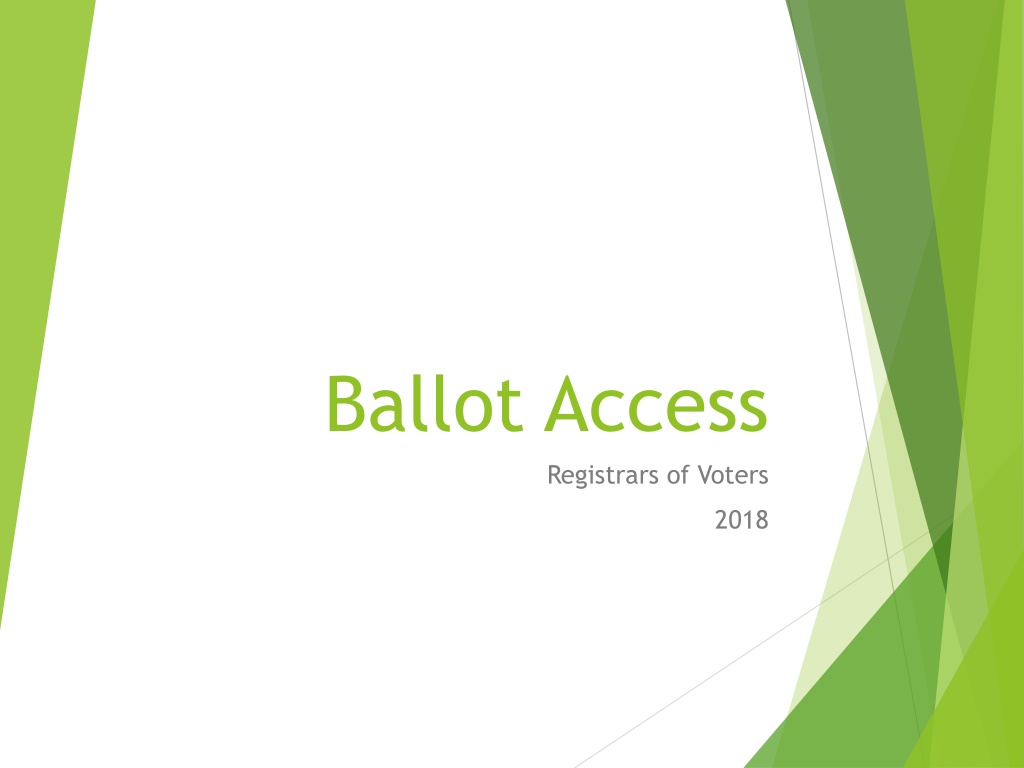
 undefined
undefined

